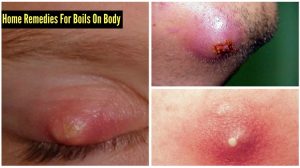 Boil or skin abscess is caused by bacterial infection in the hair follicles. They start as a small nodule and grow into a painful lump filled with pus. Boils can sometimes develop in groups which is referred as carbuncle. Improper hygiene, lot of friction and sweat are some of the reasons for the development of boils. People with diabetes, acne, eczema and alcoholism are more susceptible to develop boils.
Boil or skin abscess is caused by bacterial infection in the hair follicles. They start as a small nodule and grow into a painful lump filled with pus. Boils can sometimes develop in groups which is referred as carbuncle. Improper hygiene, lot of friction and sweat are some of the reasons for the development of boils. People with diabetes, acne, eczema and alcoholism are more susceptible to develop boils.
if the boils are accompanied by fever, swelling, change in appetite, pain in chest and rashes then it is better to consult a doctor. However, excluding the above severe cases, boils can be treated at home with many simple kitchen ingredients.
How to Get Rid of Boils with Home Remedies?
Here are the top 27 home remedies which help to treat the boils safely. Try any method as per your preference to get relief from the boils or carbuncles.
1. Turmeric
Turmeric has volatile oil containing anti-inflammatory properties which effectively treats boils. Its application bring the boil to head quickly. Its antiseptic properties prevent the bacteria from spreading.
- Blend turmeric root and water to make a paste. If you don’t have turmeric root, then you can mix turmeric powder with water.
- Apply the mixture on the boils and its surrounding skin.
- Cover the application with a bandage or gauze.
- Leave it on for 30 – 45 minutes.
- Rinse with water and pat dry.
- Repeat the process 2 times in a day for effective results.
For added benefits: Add a teaspoon of turmeric into a glass of water or milk and drink it 3 times in a day for 4 – 5 days. This helps to treat the boils from inside.
2. Ginger
The combination of ginger and turmeric safely draws out the pus from the boil. The antibacterial properties of ginger and turmeric deal with the bacteria causing boils.
- Combine equal quantities of turmeric and fresh ginger paste.
- Apply this paste on the boil and its surrounding area.
- Cover with a clean cloth or bandage and leave it on for few hours.
- Remove the bandage and Wipe it gently with warm water.
- Repeat the process regularly.
Alternative Method: In the same way, you can add yogurt or basil paste instead of ginger.
3. Salt and Warm Water Compress
Putting salt compress speeds up the healing process by bringing the pus to the head. The below process aids in reducing the pain and spreading the bacteria.
- Wash the boil and surrounding area using mild soap and warm water.
- Add 1 teaspoon of salt into 15 – 16 cups of warm water and stir well.
- Soak a washcloth in the water and wring out the excess.
- Place it on the boil and its surrounding area.
- Leave it on for 10 – 15 minutes.
- Repeat 3 – 4 times daily with fresh washcloths for best results.
- Continue for a week to 10 days to clear boils.
4. Onion
Onions contain 25 active compounds including potassium salts, oils and flavonoids which have anti-inflammatory, antiseptic, antifungal and analgesic properties. Onions, especially red onions, eliminate toxins, disinfect wounds, and relieve skin inflammation. Onions help to circulate blood and draw out the pus from boils.
- Cut an onion into slices.
- Place 1 – 2 slices on the affected area.
- Cover with a bandage or cloth.
- Change this onion poultice with a fresh one in every 3 – 4 hours.
- Repeat the process daily for few days.
Alternative Method: Cut the onion into pieces. Boil them in water until the quantity of water becomes half. Use the liquid to rinse the affected area. You can follow this remedy along with the above onion poultice for more effective results.
5. Epsom Salt
Epsom salt, or Magnesium sulfate, is an effective home remedy for treating boils. Epsom salt is a drying agent that assists in bringing boils to a head and draws out the toxins. It helps reduce swelling and pain.
- Add 1 teaspoon of Epsom salt to 3 cups of water.
- Stir well and soak clean wash cloth in the water.
- Wring out the excess water and place the wash cloth on affected area.
- Leave it on for 10 – 15 minutes.
- Repeat the process 3 – 4 times in a day for to get quick relief.
For Added Benefits: Add 2 cups of Epsom salt into your bath. Soak in it for 20 minutes and bath normally.
6. Garlic
Garlic has high deposits of sulfur containing compounds such as alliin, allicin, and ajoene which cure boils. It also has anti-inflammatory, anti-bacterial, and anti-viral properties that make garlic one of the best home remedies for treating boils.
- Heat a garlic clove until warm enough (Make sure it is not too hot). Place it on the boil.
- Alternatively, you can apply freshly blended garlic paste on the boil.
- Secure any of the above application with bandage or gauze.
- Leave it on for 10 – 15 minutes.
- Remove the bandage and wash with warm water.
- Repeat the process 3 – 4 times in a day.
For added benefits: Simply consuming garlic will assist in curing boils from inside so, add it in your daily diet.
7. Potato
Potatoes contain anti-inflammatory properties and reduce the pain caused by boils. It contains potassium and magnesium which bring the abscess to heat quickly.
- Grate a potato and extract its juice.
- Leave it on to dry completely.
- Repeat the process 3 – 4 times in a day.
For more effective results: You can apply a potato slice on the boil and secure it with a bandage and leave it overnight.
8. Mustard Poultice
Application mustard is one of the best ways to treat the boil faster. It improves the blood circulation and draws out the pus quickly.
- Blend some mustard seeds into powder.
- Mix the mustard powder with natural oils like coconut or olive oil.
- Place a thin cloth on the boil and apply the mixture on it.
- Secure everything with a bandage or gauze.
- Leave it on for 10 – 20 minutes.
- Remove the application, rinse with water and pat dry.
Caution: Don’t apply mustard paste directly as it can burn your skin.
9. Egg for Boils
Egg skin heals the inflammation and deals with the bacteria causing boils.
- Boil an egg. Remove the shell and peel the white membrane attached to it.
- Wet the white membrane and place it on the boils.
- Secure it with a bandage or guaze.
- Once the membrane dries, replace it with a fresh one.
- Repeat the process until the boil clears.
10. Sugar and Soap Poultice
Though it sounds weird this is an age old remedy which is effective in treating boils, splinter and other infections.
- Combine enough amounts of sugar and soap.
- Apply the mixture on the boils.
- Cover it with a bandage or gauze.
- Remove it after 30 minutes.
- Rinse with water and pat dry.
- Repeat the process regularly until the boils clear.
11. Apple Cider Vinegar
Apple cider vinegar is a natural disinfectant that effectively cleanses the bacterial infection from boils once it has begun to drain. It also contains anti-inflammatory properties which cure pain and inflammation while balancing the skin’s pH levels to heal it quickly.
- Apply few drops of apple cider vinegar to the affected area using a cotton ball.
- Leave it to dry completely.
- Repeat the process regularly for best results.
Caution: Dilute ACV with water if you have sensitive skin.
12. Bread and Milk Poultice
Bread is used to treat boils, skin infections, and splinters. This poultice pulls toxins from the skin and speeds up the recovery time. It has a soothing effect on the skin as well. This process reduces inflammation and brings boils to a head.
- Soak 1 – 2 bread slices in warm milk or water.
- Apply the soaked bread pieces on the affected area.
- Leave it on for 5 – 10 minutes.
- Repeat the process 2 times in a day for best results.
13. Black Seed Oil
Black seed oil contains antioxidant, and anti-inflammatory properties. Black seed contains an active compound called thymoquinone, which contains antifungal property that is helpful in treating infections including boils.
- Add 1/2 teaspoon of black seed oil to any hot or cold beverage.
- Mix well and drink it.
- Repeat the process 2 times in a day for best results.
14. Milk
Milk draws the pus from the boils, speeds up the healing process and gives instant relief from the pain.
- Combine 1 teaspoon each of milk cream, vinegar, and turmeric powder in a bowl.
- Apply the mixture to the affected area.
- Leave it on to dry completely.
- Rinse with water and pat dry.
- Repeat the process 3 – 4 times for few days to heal the boils.
15. Neem Leaves
Neem leaves have anti-inflammatory, antifungal, antibacterial, antioxidant, antiviral, and immune-modulatory properties which are essential for treating boils.
- Grind a handful of neem leaves and water to make a paste.
- Apply the paste to the affected area.
- Leave it on for 10 – 15 minutes.
- Rinse with water.
Alternative Method: Boil 2 glasses of water by adding handful of neem leaves. Boil until water becomes half to its quantity. Remove from heat and let it cool for few minutes. Use this water to rinse the boils affected area.
16. Cornmeal
Cornmeal doesn’t contain medicinal properties, but it is a natural absorptive that makes it a perfect remedy for treating boils.
- Boil water in a pan and add cornmeal to make a paste.
- Apply to the affected area and cover with a washcloth.
- Leave it on for 15 – 20 minutes.
- Repeat the process 2 – 3 times daily for best results.
17. Onion and Garlic Juice
This combination is an Ayurvedic treatment for curing boils. Both onion and garlic contains antibacterial and anti-inflammatory properties.
- Blend 1 onion and 2 – 4 garlic cloves.
- Strain the mixture to extract the juice.
- Apply the juice to the affected areas.
- Leave it on to dry completely.
- Wipe off the application carefully and rinse with warm water.
- Repeat the process 4 – 5 times daily for best results.
18. Tea Tree Oil
Tea tree oil contains antibacterial, antiseptic, antifungal, and antimicrobial properties that makes tea tree oil help cure boils effectively.
- Wash the boil and surrounding area using mild soap and warm water.
- Apply a few drops of tea tree oil to the affected area using a cotton ball.
- Cover with an elastic bandage, if desired.
- Repeat the process 3 – 5 times daily for best results.
Caution: If you have sensitive skin, dilute the oil with water to avoid skin irritation.
19. Enchinacea
Echinacea is an herb that has antibacterial, antitumor, antiviral, and immune-stimulant properties. It directly inhibits the staphylococcus aureus, a bacterium responsible for the formation of boils. Echinacoside is, easily available in extract, powder, tea, capsule, or ointment form for oral or topical application. Consult a professional for proper guidance on appropriate doses.
- Steep 1 teaspoon of Echinacea in a cup of warm water for 10 – 15 minutes.
- Strain and drink tea twice a day.
- For added Benefits: you can add 1 part Pasque flower and 2 parts of wild indigo.
- Alternatively, you can apply this tea on boil affected area.
Caution: Pregnant or breastfeeding women should NOT take this herbal remedy. Avoid this process if you’re allergic to daisies, ragweed, chrysanthemums or marigolds.
20. Cumin
Cumin seeds are very effective in preventing boils by draining out the pus, reducing swelling, and pain.
- Crush 50gms of cumin seeds into powder.
- Add enough amounts of water to make a paste.
- Apply the paste on the affected area.
- Leave it on to dry completely.
- Repeat the process regularly to reduce boils.
21. Japanese Honeysuckle
Japanese honeysuckle, Lonicera japonica, is most commonly used in traditional Chinese medicine for treating boils and other bacterial infections. This herb acts as an efficient antibiotic due to its chlorogenic acid. It also contains Luteolin which acts as an antioxidant and anti-inflammatory agent.
- Place the 15 – 30gms of dried honeysuckle stems in a jar.
- Pour 600ml of water on them and steep for 2 – 3 hours or overnight.
- Use a cheesecloth or sieve to strain the liquid.
- Apply the solution on the affected area.
- Leave it on until dry.
- Rinse with water and pat dry with a soft washcloth.
- Repeat the process regularly for best results.
- Alternatively, you can use this water to rinse the affected area several times a day.
22. Parsley
Parsley helps boils burst quickly without spreading infection as it has anti-bacterial, anti – oxidant, and anti-fungal properties. If applied regularly, parsley will soothe irritated or inflamed skin.
- Boil parsley leaves and water in a pan for few minutes.
- When cool, wrap leaves in a clean cloth and apply this poultice to the affected area.
- Leave it on for 2 – 3 hours and remove.
- Repeat the process regularly to get rid of boils.
23. Castor Oil
Castor Oil is widely used by the Indian Traditional Medicine System, Ayurveda, for treating boils. It contains Ricinoleic which possesses anti-inflammatory, antibacterial, antifungal, and anti-viral properties.
- Apply a few drops of castor oil to the affected area using a cotton ball.
- Cover with a bandage or gauze.
- Leave it on for 3 – 4 hours or overnight.
- Repeat the process regularly for best results.
24. Betel Leaves
Betel leaves contain tannins and other essential oils that prevent infection and heal the skin. They also have anti-protozoan, antiseptic, antifungal, and antibacterial properties that draw the pus from the boils and clear toxins quickly.
- Warm a betel leaf and apply castor oil as a layer on the leaf.
- Place the warm leaf on affected area.
- Cover with a bandage or cloth.
- Leave it on for 2 hours.
- Replace old with a new oil applied warm leaf and leave it for another 2 hours.
- Repeat the process regularly for best results.
Alternative Method: Blend betel leaves with water to make a paste. Apply the paste on boil and secure it with a gauze. Leave it on for an hour and reapply the paste. Now rinse off the paste after 2 hours and pat dry. Repeat the process 2 times in a day.
25. Jelly Jar
Applying suction to a boil will cure the problem. It increases blood flow in the affected area and pressure to draw out the pus.
- Fill a bowl with hot water.
- Soak a cup in the water until warm.
- Place the cup over the boil.
- When the pus rises, gently wipe it away and rinse the area with water.
- Repeat the process regularly for best results.
26. Eucalyptus Oil
Eucalyptus oil has antiseptic, antibacterial, and antiviral properties that soothe skin and relieve irritation and pain. Slippery elm also effectively treats boils.
- Mix 3 drops of eucalyptus oil, 25 grams of powdered slippery elm, and boiling water to make a paste.
- Apply the mixture to the affected area.
- Leave it on dry completely.
- Repeat the process 2 – 3 times daily to heal boils.
27. Basil and Asafetida
Basil has anti-bacterial, antiseptic, and anti-inflammatory properties. When it is mixed with asafetida, it becomes one of the best remedies to treat boils.
- Blend a handful of basil leaves, a small piece of ginger, and a pinch of asafetida to make a paste.
- Apply the mixture to the affected area.
- Rinse off the application after 30 minutes.
- Repeat the process regularly for best results.
Dietary Changes for Treating and Preventing Boils
As boils are caused by bacterial infection, a strong immune system is very essential to treat and prevent the infections. Here are few tips you can follow to strengthen the immune system.
- Foods rich in vitamin C such as berries, citrus fruits, kiwi, melons, peppers, peas, pineapple, spinach, sweet potatoes, tomatoes, and winter squash. You have to take 3000 mg daily to treat bacterial infection.
- Eat foods rich in vitamin E such as pine nuts, almonds, raw seeds, Swiss chard, mustard green, kale, plant oils, hazelnuts, avocado, parsley, olives, wheat, and dried herbs.
- Include foods rich in vitamin A such as carrots, iceberg lettuce, sweet potato, cod liver oil, paprika, turkey liver, whole milk, mango, kale, cantaloupe, dried apricots, tomatoes, dried marjoram, peaches, papaya, dandelion greens, and oatmeal.
- Consume foods rich in Phytonutrients such as spirulina, barley, chlorella, wheat grass, kelp, and chicory root.
- Liver-detoxifying food such as dandelion, artichoke, peppermint, kelp, milk thistle, and burdock.
- Foods rich in zinc such as cocoa, dark chocolates, beans, mushrooms, pork, chicken, nuts, seafood, and toasted wheat germ. You have to take 50gms.
- B-complex vitamins.
- Drink Astralagus tea.
- Avoid foods high in fat and sugar such as cakes, chocolates, and white bread.
- Avoid caffeinated or carbonated beverages.
Tips and Precautions:
- Regularly wash your hands with anti-bacterial soap and use hand sanitizer.
- Keep towels and clothes clean and dry. Avoid sharing towels, clothes, or bedding.
- Regularly exfoliate the skin to clear sweat ducts.
- Never squeeze or lance a boil as it causes pain, swelling, and spreads the infection to the surrounding areas, making the problem worse.
- Don’t buy any over-the-counter products claiming to draw out pus from boils. They actually irritate the boil and make it burst prematurely, causing further infection.
- Gently wash the boil and its surrounding area daily to prevent bacteria and oil buildup on the skin’s surface using a sponge or loofah. Pat dry with a clean, soft cloth.
- Always clean cuts and wounds immediately to kill bacteria and cover them with a bandage so that they heal properly.
- Colloidal silver cream is a natural disinfectant. Apply to the affected area twice daily.
- Apply anti-bacterial creams or ointments to the affected area and cover with a bandage or gauze, allowing it to drain naturally.
- Salt helps drain the pus and dries the boil completely.
- Use marshmallow leaf or figwort as a bandage or poultice to heal boils quickly.
- Drink hot water frequently to flush harmful bacteria from the body.
- Boil fenugreek seeds in a water and crush them. Apply this paste to get relief from it.
- Apply calendula ointment, an antiseptic, to unbroken boils to decrease inflammation.
- Consult your healthcare provider or doctor immediately if not cured within 3 – 4 days or if you experience fever or increased pain.
Have you tried any of these methods? Do you know any other methods to treat boils like using baking soda? Share your experience with us!
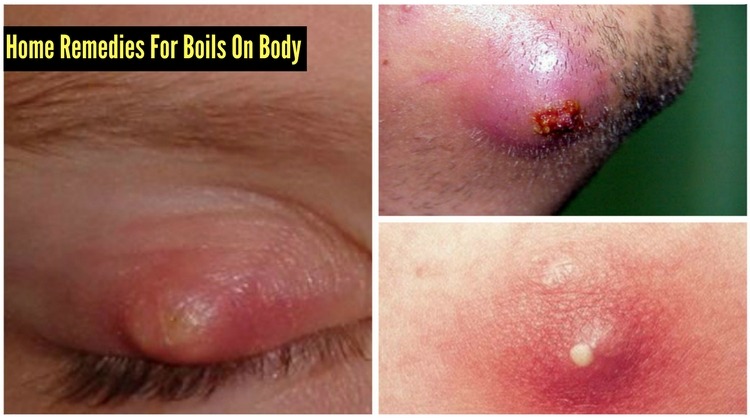

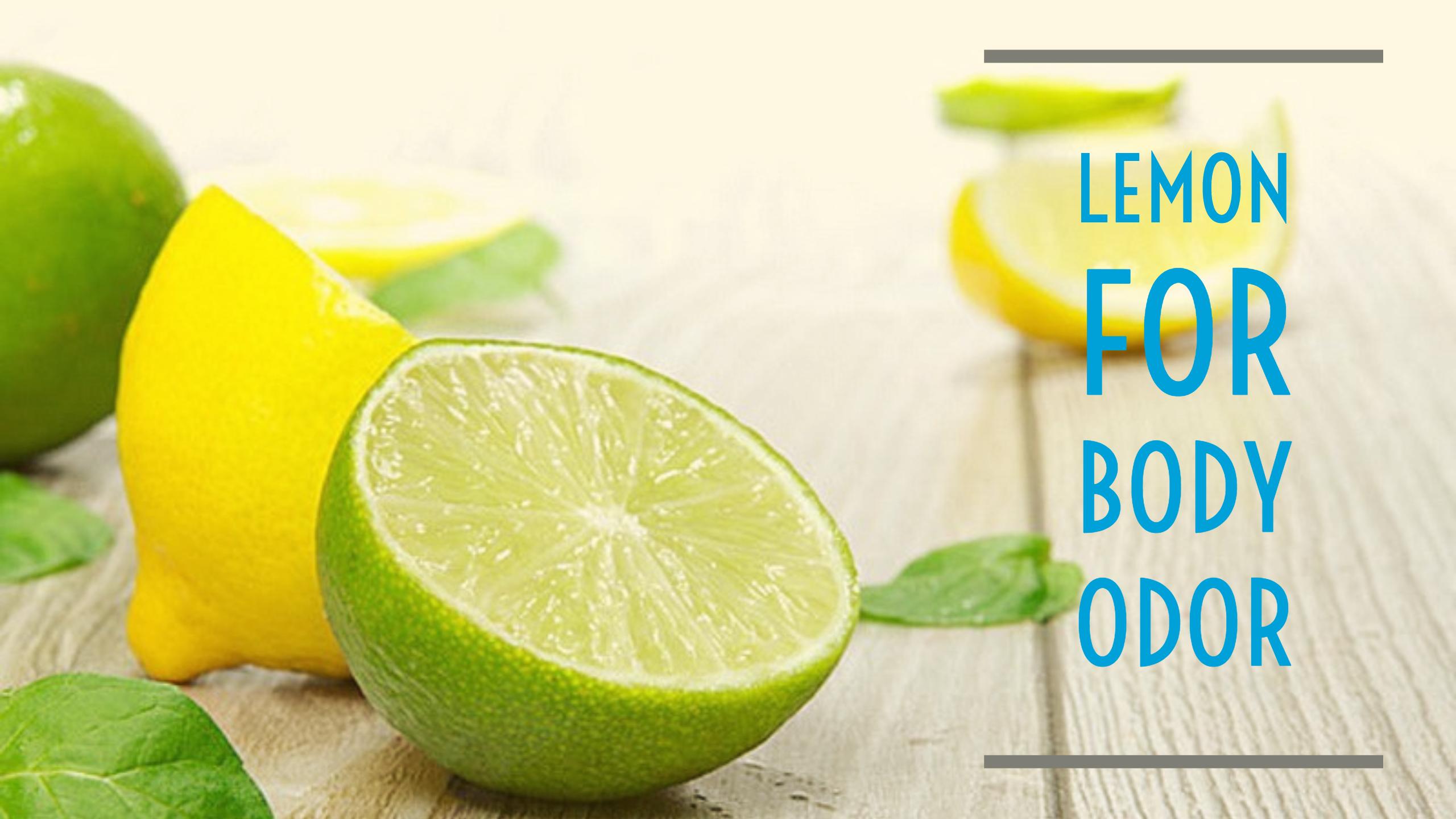

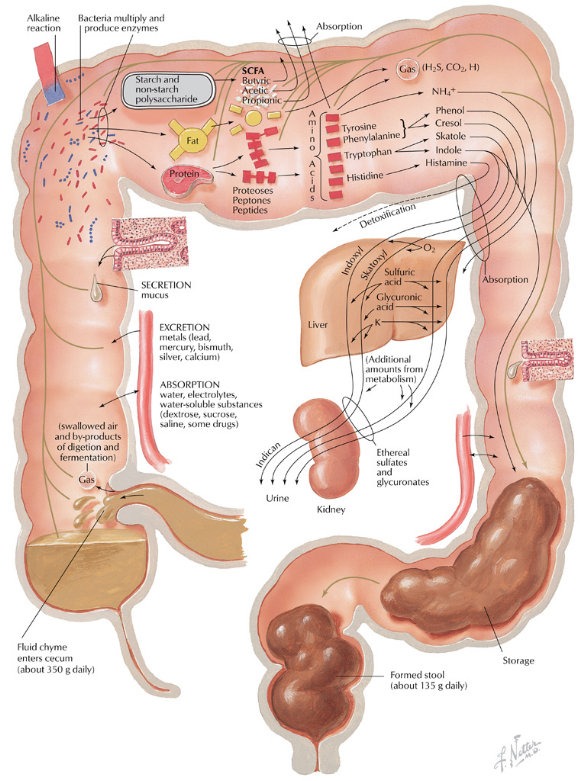



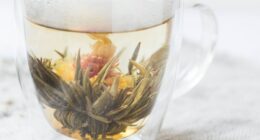

17 comments
Can I use parsley, or
Garlic powder, or dry minced onion, or dry chopped garlic, or Italian seasoning, or salt ,to bring out a boil to drawing the pus out on a boil
Apart from Italian seasoning, you can try any one of them to draw the pus out on the boil.
Try vick s vapo rub. Put some in and a few minutes later you can start wiping away the pus.
Thanks a lot for, the treatments are very amazing. I am just trying the turmeric, vineger and and milk on my boils. I had some injections 6 months ago but the ones on my left boutocks kept on paining me and now swollen. Can this natural reamedy bring me relief?
Yes, it can. Try it regularly for few days to get the results.
As a child some70 years ago, I had a problem with boils on my upper arms and the back of my head. My parents evidently heard from our old country doctor to take sulfur, so I did. Took sulfur tabs, didn’t mind them as they kinda tasted like candy. Now today, 70 years later, can you believe I began getting boils in my arm pits. So to the feed store I went, bought some goat salve that was very high in sulfur. I mixed that 50/50 with Preparation H. Yes, Prep H has great healing properties (not as good though since it no longer contains shark oil). We call Prep H our APO, All Purpose Ointment.
I applied the 50/50 ointment to the under arm area and in a few days the boil ceased growing and then began to go away. I had to have some relief and soon received it. When another boil came up I treated it the same way and it has now been months since I have any return. It may sound like snake oil, but don’t knock it till you have tried it.
Hope this is as effective for you as it has been for me. Larry
Thanks for sharing your experience and suggestions.
I have tried steaming my face, also i have used a milk and bread compress on my boil which is on the side of my nose. A head has appeared on it a few times but keeps going away. Its been over a month now. What remedy do you recommend for this?
We recommend consulting a dermatologist as you have been trying home remedies for almost a month.
Hello, I just wanted to let you know what has worked for me. I get horrible carbuncles about three times a year. As soon as I notice it I get a tea bag and get it as hot as I can, place it on the boil ( carbuncle) I use medical tape and put it over the tea bag and go to bed. Takes about two days but it works. I can’t get to the store for a few days and of course no tea in the house so, I searched to find an alternative and found your site. Crossing my fingers the potato or onion will work. Always have those on hand. Very nice article, thank you for sharing it.
Thanks for sharing your experience.
I have tried the potato. It does help to ease the pain a lot and bring all the infection to one place. I’ve started the potatoes last night. Here it is almost 2 days later and I’m finally starting to see a head. So id recommend the potato. I cut a slice the long way and left the skin on the back to help stick to the bandaid
Do you get the teabag wet, or just heat the teabag in microwave dry?
Hello, pls I’d like to know if penicillin ointment is good for boil? I’ve been rubbing it on the boil around my philtrum and it seems to work cause it exfoliates the pus inside but it’s taking long to heal completely. I’m now applying castor oil hopefully it should heal it completely. Thanks
I have one on my forehead that won’t come to a head…will have to try some of these
Can I use regular mustard? My dad keeps saying I can.
I have a chronic boil problem and many times they become abscessed so quickly that they require antibiotics and draining by a physician. However, when they are treatable at home I use several of these remedies depending on the location. From my personal experience, soaking in a tub filled with hot(not scalding) water and about half to 3/4 cup of epsom salt and 2 tbsp of tea tree oil a few times a day helps to draw the pus to the surface and begin the draining process. It’s also a good way to prevent them from happening especially if you get them after shaving. The tea tree oil treats and prevents a lot of bumps caused by bacteria on the skin. I highly recommend it. You can put some on a cotton pad and wipe any areas that are boil-prone. If it’s too strong for your skin on its own, try diluting it in avocado oil or olive oil. Turmeric paste works with or without ginger, using a tea bag as a warm compress works especially when you soak it in hot water with epsom salt added. The type of tea isn’t that important, but I’d imagine there would be added benefits if you chose one that would also soothe the inflammation or fight bacteria like ginger or green tea. Taking turmeric supplements has helped me tremendously when it comes to preventing them. The biggest piece of advice I can give you is don’t squeeze them. It only pushes the bacteria further into the skin and makes things worse. I know it’s tempting, but unless getting cut open and having the boil dug all in to break up pockets of infection with little pain relief (deep infections make it difficult for lidocaine to work properly…trust me) sounds like something you’d like to do just don’t do it…AND if it gets really inflamed, hot to the touch, and/or extremely painful go see a dr b/c even if you do manage to get rid of it superficially, chances are it will come back unless it is properly drained. No, it isn’t a pleasant experience, but the relief is almost instant and you will be glad you did.